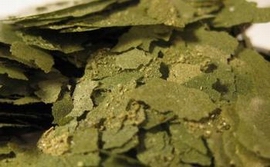 A study in Journal of Medicinal Food suggests that taking a dietary supplement call spirulina can help type 2 diabetes manage serum blood sugar.
A study in Journal of Medicinal Food suggests that taking a dietary supplement call spirulina can help type 2 diabetes manage serum blood sugar. Panam Parikh, MSc from Department of Foods and Nutrition, M S University of Baroda, in Vadodara, Gujarat, India and colleagues conducted the study and found patients with type 2 diabetes mellitus taking Spirulina for two months improved the blood sugar and lipid profile and a diabetes biomarker HbA1c.
Spirulina is known to enhance immunity against infections such as HIV, allergy and caner and cardiovascular disease like stroke. The current study was intended to evaluate its effect on the blood glucose and cholesterol in patients with type 2 diabetes mellitus.
Twenty-five subjects with type 2 diabetes mellitus were enrolled in the study and randomly assigned to receive 2 grams of Spirulina per day or a placebo for two months. At baseline, the control and study groups had similar medical and nutritional profiles. Blood glucose, glycosylated hemoglobin (HbA1c, which indicates the degree of type 2 diabetes mellitus for a relatively long term) concentrations and lipid profiles in the participants before and after intervention.
Lowered fasting blood glucose and postprandial blood glucose concentrations and reduced HbA1c levels were found in those taking Spirulina supplements. These
indicate that spirulina improved long term glucose regulation. Spirulina supplementation also lowered serum triglyceride concentrations, total cholesterol and lowdensity lipoprotein cholesterol and increased the level of high density lipoprotein cholesterol.
Additionally, the researchers observed "a significant reduction in the atherogenic indices, T C:HDL-C and LDL-C: HDL-C" and "The level of apolipoprotein B registered a significant fall together with a significant increment in the level of apolipoprotein A1" leading to a significant and favorable increase in the A1:B ratio.
They concluded "These findings suggest the beneficial effect of Spirulina supplementation in controlling blood glucose levels and in improving the lipid profile of subjects with type 2 diabetes mellitus."





